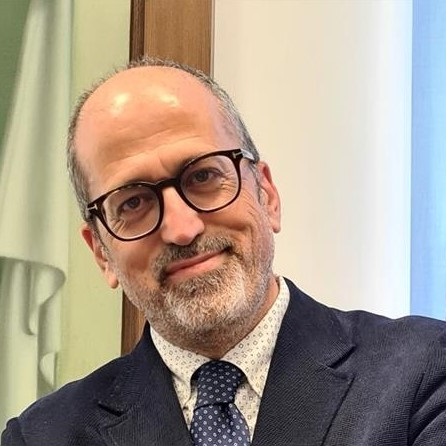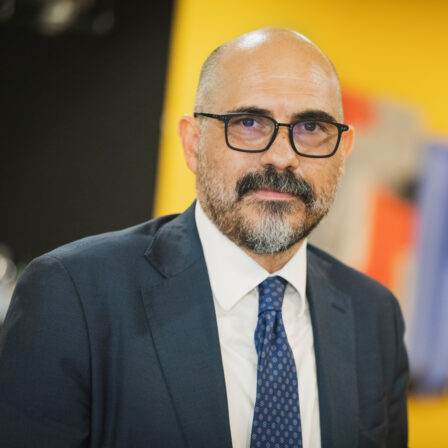Rector
 Massimiliano Fiorucci, Rector of Roma Tre University since 22 June 2022, Full Professor in the scientific–disciplinary sector M-PED/01, he teaches general, social and intercultural Pedagogy. From 17 December 2017 to 21 June 2022 he was Head of the Department of Education Science of Roma Tre University, he coordinated the Board of Academic Chairs of Departments and he was a member of the Academic Senate of Roma Tre University. Within the Department of Education Science, he coordinates the CREIFOS (Research Centre of Intercultural Education and Development Education) (Link identifier #identifier__196042-1www.creifos.org) and he has been Head of Second Level Professional Courses in “Intercultural Education”. Since January 2021 he has been National Chair of Italian Association of Pedagogy (SIPED – Link identifier #identifier__83770-2www.siped.it).
Massimiliano Fiorucci, Rector of Roma Tre University since 22 June 2022, Full Professor in the scientific–disciplinary sector M-PED/01, he teaches general, social and intercultural Pedagogy. From 17 December 2017 to 21 June 2022 he was Head of the Department of Education Science of Roma Tre University, he coordinated the Board of Academic Chairs of Departments and he was a member of the Academic Senate of Roma Tre University. Within the Department of Education Science, he coordinates the CREIFOS (Research Centre of Intercultural Education and Development Education) (Link identifier #identifier__196042-1www.creifos.org) and he has been Head of Second Level Professional Courses in “Intercultural Education”. Since January 2021 he has been National Chair of Italian Association of Pedagogy (SIPED – Link identifier #identifier__83770-2www.siped.it).
From 2018 to 2021 he was Deputy Chairman of the National Academic Board of Education Science (CUNSF). He, previously, was coordinator of the PhD in Pedagogy and of the Degree Course in Education Science. He is a member of the “National Observatory for the integration of foreign students and intercultural Education” within the Italian Ministry of Education. His main research interests are in social and intercultural pedagogy with a focus on topics related to the inclusion of students from a migrant background, social inequalities and early school leaving along with general and social pedagogy, adult education, training needs analysis and quality of training.
He has a scientific production of over 250 works.
Coordination Secretariat
| Link identifier #identifier__49344-3segreteria.rettore@uniroma3.it | |
| Telephone | 06 5733.2403 -2236 -2479 |
General Director
 Alberto Attanasio is the Director General of Roma Tre University since 16 October 2023.
Alberto Attanasio is the Director General of Roma Tre University since 16 October 2023.
Graduated in Architecture in 1997, he has held positions in both private and public sector focusing on themes of architectural and environmental design.
He works at Roma Tre since 2005 performing the assignments as head of the Property Assets Area and Chief Executive officer handling the complex management of the University’s real estate always giving priority to an innovative and integrated strategic approach. As a Chief Executive officer, he had the opportunity to supervise many of the most important and complex processes for the development strategy of Roma Tre. Among these, the construction of the rectorate in Via Ostiense 133 and the new University campus in Ostia as well as the progressive establishment of the Department of Architecture in the former Slaughterhouse of Testaccio and the scientific Departments in Valco di S. Paolo area.
Coordination Secretariat
| Responsible | Fabiana Giustibelli |
| Telephone | 06 5733.2259 -2358 |
| Link identifier #identifier__48087-4segreteria.direzione@uniroma3.it | |
| PEC | Link identifier #identifier__24761-5amministrazione@ateneo.uniroma3.it |
Academic Senate
The Academic Senate is the central governing body representative of the various scientific-disciplinary areas and University’s components. It contributes to the definition of the University’s strategies by formulating proposals and opinions on issues related to the organization, implementation, and control of research activities, teaching, training and student services.
Board of Administration
The Board of Trustees performs the responsibilities related to the administrative, financial, economic and asset management of the University as well as the management of technical-administrative and library staff without affecting the responsibilities assigned to the General Directorate and the autonomous administrative centers identified according to the statute and regulations of the University.
Equal opportunities and workers’ welfare committee
The committee promotes equal opportunities for the whole university community, proposing measures and actions aimed at preventing and contrasting any form of discrimination according, as well, to the University Ethical Code (CUG), particularly effective gender equality, discrimination in professional education, access to employment, working conditions, career progression and salary, proposing the necessary initiatives to remove them.
